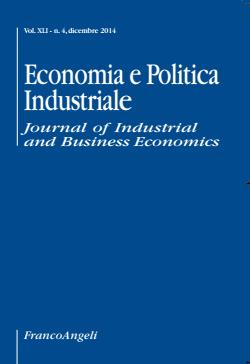
LIBRI DI MASSIMO COLOMBO
La ricerca ha estratto dal catalogo 22 titoli


As the world economy battles a global crisis of historical breadth and depth, NTBFs (new technology-based firms) are navigating in rough seas. In fact, the radical changes in the competitive arena triggered by the crisis are prompting NTBFs to change their strategies in order to reorient resources and capabilities. The paper adopts the dynamic capabilities perspective to shed light on two research questions: (i) What is the impact on the growth of an NTBF of its dynamic capability to reorient the firm’s strategies to deal with the crisis? and (ii) What are the precursors of this dynamic capability? The paper develops and tests a set of hypotheses using a unique dataset of Italian NTBFs. The econometric results of our analysis show that such dynamic capabilities have a positive effect on NTBF growth and, moreover, that these are positively correlated with the industry-specific technical work experience of the founders of the NTBFs, the NTBFs’ presence as insiders in the international markets, their forging of technological alliances, and their limited resources.



Esperienze di ricerca in Toscana
Le “forme” assunte dall’integrazione variano di territorio in territorio, di città in città, di quartiere in quartiere. Il volume presenta una serie di “sguardi locali” sull’integrazione, che spaziano dalle tematiche più specificatamente territoriali e politiche a quelle più culturali, dalle questioni legate alla dimensione identitaria a quelle relative al mercato del lavoro e alle problematiche abitative.
cod. 907.47




The impact of venture capital financing on the investment cash flow sensitivity - In this paper we study the effect of venture capital (VC) financing on firms’ investments in a longitudinal sample of 374 Italian unlisted new-technology-based firms (NTBFs) observed over the 10-year period from 1994 to 2003. In particular, we consider the influence of VC on both firms’ investment levels and the sensitivity of investments to firms’ cash flows. We also distinguish the effects of VC financing according to the type of investor: financial VC (FVC) investors and corporate VC (CVC) investors. We show that the investment rate of Italian NTBFs is strongly and positively correlated with their current cash flows. We also find that after receiving VC financing, NTBFs increase their investment rate independently of the type of VC investor. Even though, on average, VC financing seems not to affect the sensitivity of investments to cash flows, we have found that there is substantial heterogeneity according to the type of VC investor. In fact, CVC-backed firms still exhibit positive investment-cash flow sensitivity. Conversely, when firms receive VC financing from an FVC investor, the sensitivity of investments to cash flows disappears. Therefore, while this study clearly indicates that VC financing is beneficial to NTBFs, it also suggests that managers of NTBFs looking for external financing should be aware that the nature of these benefits depends crucially on the type of investor. .
Keywords: investment, new technology-based firm, pecking order, venture capital, corporate venture capital
Parole chiave: investimenti, imprese ad alta tecnologia, pecking order, venture capital, corporate venture capital .
Jel Classification: G32 - D92 - G23

Il caso della provincia di Milano
cod. 741.2


cod. 380.301


IX Rapporto sulla tecnologia dell'informazione e della comunicazione in Italia
cod. 571.1.10

This paper investigates the determinants of the start-up size of new technology-based firms. While previous empirical studies generally focussed on industry-specific variables, we draw attention to firm-specific effects. In particular, we consider the impact on start-up size of the human capital of founders and their ability to resort to external sources of financing. In the empirical section we consider a sample of 391 young Italian firms operating in high-tech industries in both manufacturing and services. The econometric estimates confirm the explanatory power of firm-specific effects, in addition to the industry-specific effects highlighted by previous work. In particular, they indicate that the human capital of founders and the ability to have access to private equity financing figure prominently in explaining firms’ start-up size, while the effect of bank debt is negligible. Furthermore, the specific component of human capital associated with industry-specific professional knowledge and managerial and entrepreneurial experience is found to have a greater positive impact on initial firm size than the generic component, proxied by education and general (i.e. non industry-specific) working experience. This holds true especially for firms that obtain access to private equity, pointing to the complementarity between entrepreneurial talent and external financing.


The present paper aims at studying the determinants of organizational change by looking at the evolution of the organizational structure of a sample of Italian metalworking plants. Evidence shows that organizational factors, such as the size of the bureaucratic structure and influence activities, and technology adoption of advanced manufacturing technologies and human resource management practices stand high in explaining organizational change.


cod. 571.1.2
